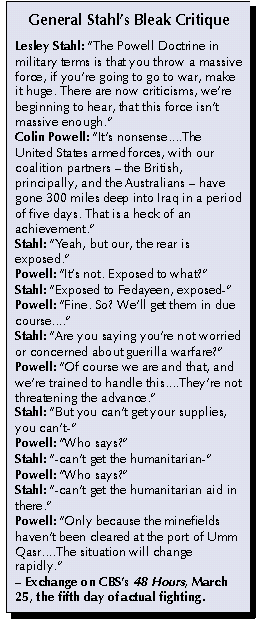 |
||||||||||||
|
||||||||||||
 |
||
|
 |
||||||||||||
|
||||||||||||
 |
|||||||||||||||||||||||||||||||||||||||
|
|||||||||||||||||||||||||||||||||||||||
|
Grading TV's War News
Fox News Channel and Embedded
Reporters Excelled,
While Peter Jennings and Peter Arnett Flunked
By Brent
Baker and Rich Noyes
April 23, 2003
Section 2 of 4
|
CBS News CBS’s lowest point came before the war, when anchor Dan Rather traveled to Baghdad for a softball interview with Saddam, asking the man who had killed thousands of his own people, “What are the chances this is the last time you and I will see each other?” But CBS’s war coverage was far superior to ABC, with much less gloomy speculation and a greater emphasis on factually reporting battlefield developments; day after day CBS’s Pentagon reporter David Martin gave the most accurate overview of the war’s progress.
Jennings seemed to be talking about a different war: “On World News Tonight, the U.S. attacks all over Iraq, the drive on Baghdad is cautious. There is opposition and there is weather. The Iraqi leader is alive and on television. Who knows how well he is. The U.S. believes he is still in control. Two more Americans are captured, their helicopter shot down. So many others are coming back full of bullet holes. And the pictures of the POWs. So public now, such pain for the families.” As events unfolded, it became obvious that Rather’s impressions of a successful U.S. drive to Baghdad were more CBS War Coverage accurate than Jennings’s pessimism. Also on March 24, CBS reported a positive story about how the U.S. was aiding Iraqi civilians. Phil Ittner, embedded with the Army’s 3rd Infantry Division, showed a U.S. soldier cradling a little girl as his colleagues provided medical aid to her family: “A family of Iraqi civilians, wounded in the conflict, again brought these soldiers streaming out to give what aid they could. This young boy suffered burns and wounds to the face and back. These soldiers say they’re here to take down the leadership in Baghdad which they see as a threat to their families back home. But despite the politics, as they comforted a young Iraqi girl whose family found itself victim of the fighting, nearly all of them said the same thing: that they wish they didn’t have to do it.” The discrepancies between ABC and CBS continued the next night, March 25, as ABC argued that the U.S. invasion precipitated a water emergency in southern Iraq. In Basra, ABC’s John Donvan dated the loss of water in Basra to “five days” ago, meaning the war caused it, and he outlined the potentially disastrous results: “Day and night, the fighting in Basra has been too intense for aid workers to enter the city. A million people live in Basra, hundreds of thousands of them have been without clean water for five days, the city’s electricity went out last week. The possible consequence: cholera for a start, also diarrhea, which in Iraq often kills young children.” But over on CBS, Scott Pelley discovered that the water had been “turned off” days before the war started. In Umm Qasr, south of Basra, Pelley asked U.S. Army Major James Thorpe: “Major, why do these people not have water?” Thorpe explained: “Basra, it’s a city just north of us, is normally the location where drinking water comes from for these folks here in Umm Qasr. As it turns out, just before the war started, approximately four or five days before it did, the water that normally flows down here via truck was turned off.” Pelley asked: “By who?” Thorpe replied: “Well, basically by the ruling party, the Ba’athist party, and I guess, Saddam Hussein.”
On April 4, after CBS showed videotape of a purported Saddam Hussein walking tour of a Baghdad neighborhood, Pentagon reporter David Martin observed, “Saddam may look confident and in charge, but his military situation is disastrous. Enemy troops at his airport and in his suburbs and his best divisions being chewed up by a ceaseless rain of bombs and artillery shells....With Marines already pressing the attack against another Republican Guard division, there’s every reason to believe it’s only a matter of time before all of Saddam’s divisions are gone.” Yet that same night on ABC’s World News Tonight, Pentagon reporter John McWethy emphasized a more negative scenario: “As the U.S. begins to really squeeze Baghdad, U.S. intelligence sources are saying that some of Saddam Hussein’s toughest security forces are now apparently digging in, apparently willing to defend their city block by block. This could be, Peter, a long war.” Peter Jennings felt vindicated: “As many people had anticipated.”
Many of the same war correspondents were featured on both NBC and MSNBC during the course of the war, so their reporting will be analyzed together. Generally, NBC and MSNBC offered solid, factual coverage, especially from their strong team of embedded reporters. (See the embedded reporters section.) MSNBC emphasized its patriotism with devices such as “America’s Wall” — a billboard of photographs of military personnel fighting in the war, sent to the network by their friends and families. Both networks’ grades were marred by their use of National Geographic Explorer’s Peter Arnett as a Baghdad reporter, which will be discussed in the “Baghdad reporters” section of this report.
It took nearly two weeks for Williams to redeem himself, on the April 2 NBC Nightly News, as he rejected the same analogy he had forwarded during the first days of the war: “Civilians used to be intentional military targets. The fire bombings of Dresden and Tokyo in World War II were meant to kill civilians and then terrorize survivors. Here we’ve seen the opposite happen. U.S. forces have more than once been the targets of civilian attacks and could be forced into killing coerced human shields despite all attempts to avoid it.” MSNBC’s coverage of the public’s reaction to the war showcased more than just the small minority who opposed using force. On the first Saturday of the war, for example, MSNBC placed Ashleigh Banfield near the Army base at Fort Campbell, Kentucky, where at about 6:20am ET she highlighted the “wives and families, very concerned about their 101st Airborne Division husbands overseas.” Banfield added that she had “attended a candlelight vigil where we saw a chaplain, a stand-in chaplain taking over for the four chaplains who’ve been deployed, praying not only for the safety of those husbands, but also for their success in the mission.” On March 26, just as ABC was emphasizing angry Iraqis condemning the United States, NBC’s Don Teague, in a story which ran on MSNBC as well as the NBC Nightly News, pointed out that the pro-Saddam speeches from Iraqi citizens were pure theater. Teague observed: “U.S. soldiers escorted this convoy into Iraq, but publicly, few here were singing their praises.” He showed an Iraqi man in the crowd: “Saddam good. Saddam gives eat and water and clothes.” But then Teague suggested: “Wherever there are cameras, Saddam Hussein is still the hero. Iraqis, not yet convinced he’s lost control, worry they’ll pay with their lives for speaking against him.” A U.S. Army Sergeant, Johnny Monds, validated Teague’s observations: “They do it for the cameras because they’re scared.” ABC eventually made the same point for viewers, but not until the March 28 World News Tonight. (For more, see the section on ABC News.) NBC anchor Tom Brokaw usually struck a middle ground between Rather’s optimism and Jennings’ pessimism. On April 2, for example, Brokaw summarized: “The war against Iraq began two weeks ago tonight with a strike at a Baghdad residence where Saddam Hussein and his sons were believed to have been staying. Now, 14 days later, after an unexpectedly difficult ground war on the way to Baghdad, American and coalition forces are within 19 miles of the Iraqi capital....A lot of progress for the United States and the allies in the last 24 hours, but now the very difficult assignment: taking on Baghdad, with the Saddam Hussein regime showing no signs of folding anytime soon.” MSNBC offered an eclectic mix of U.S.-based anchors. Lester Holt was neutral and straightforward, and never seemed to tire as he stayed on the air for hours at a time. New 8pm ET anchor Keith Olbermann provided perhaps the most bizarre commentary on April 3, when he compared a gas station’s giveaway of $10 in free gas to vehicles bearing American flags with “suicide bombers” and “human shields.” According to Olbermann, all three are examples of “purchased patriotism.” Olbermann suspected some drivers put flags on their cars even if they weren’t in an especially patriotic mood: “I don’t think I’m going way out on a limb here to assume that somewhere in that block’s long line of drivers near Lake Ronkonkoma waiting for their five free gallons, were a few who weren’t really that gung ho about the war, but just stuck a flag in their windshield wiper to get the gasoline
gratis. Unintentional or not, that’s purchased patriotism. And as we are reminded every time we hear about Iraqi human shields and forced suicide bombers, purchased patriotism is one of the things we’re fighting against.”
The Media Research Center For an interview with an MRC Spokesman, please contact Katie Wright at (703) 683-5004
Home | News Division
| Bozell Columns | CyberAlerts |
||||||||||||





 Contrast the way Rather and Jennings began their newscasts on March 24, the fourth day of the war. Opening his
Evening News, Rather was upbeat: “Barreling toward Baghdad. Fast moving U.S. ground forces fight their way to within miles of the capital. Up above, air raids try to cut up and cut off Iraqi divisions. Iraq insists Saddam is alive, well and in control.”
Contrast the way Rather and Jennings began their newscasts on March 24, the fourth day of the war. Opening his
Evening News, Rather was upbeat: “Barreling toward Baghdad. Fast moving U.S. ground forces fight their way to within miles of the capital. Up above, air raids try to cut up and cut off Iraqi divisions. Iraq insists Saddam is alive, well and in control.”
 CBS did show some of the same second-guessing that tainted ABC’s coverage. On the March 25
48 Hours, Lesley Stahl challenged the military’s war plan after only five days of fighting. She asked a Vietnam vet: “You fought in Vietnam. Are you getting any feelings of deja vu?” Then, in an interview with a former chairman of the Joint Chiefs of Staff, Secretary of State Colin Powell, Stahl ventured far beyond the limits of her military acumen. (See box.)
CBS did show some of the same second-guessing that tainted ABC’s coverage. On the March 25
48 Hours, Lesley Stahl challenged the military’s war plan after only five days of fighting. She asked a Vietnam vet: “You fought in Vietnam. Are you getting any feelings of deja vu?” Then, in an interview with a former chairman of the Joint Chiefs of Staff, Secretary of State Colin Powell, Stahl ventured far beyond the limits of her military acumen. (See box.)
 Stahl’s glum prognosis notwithstanding, positive developments were generally presented as good news on CBS. On the April 2
CBS Evening News, for example, Rather exulted: “There is major progress and a stunning battlefield victory to report. The U.S. military says two key
Republican Guard divisions protecting Baghdad have been beaten so badly they are, quote, ‘no longer credible forces.’ They were pummeled by U.S. forces now closing in on the capital from two sides. To the east, advancing U.S. Marines are now within 30 miles or less of the outskirts of Baghdad. To the west, lead elements of the Army’s third infantry are within 20 miles or less.”
Stahl’s glum prognosis notwithstanding, positive developments were generally presented as good news on CBS. On the April 2
CBS Evening News, for example, Rather exulted: “There is major progress and a stunning battlefield victory to report. The U.S. military says two key
Republican Guard divisions protecting Baghdad have been beaten so badly they are, quote, ‘no longer credible forces.’ They were pummeled by U.S. forces now closing in on the capital from two sides. To the east, advancing U.S. Marines are now within 30 miles or less of the outskirts of Baghdad. To the west, lead elements of the Army’s third infantry are within 20 miles or less.”
 MSNBC got off to a rocky start, as anchor Brian Williams — who sometimes generated long-winded and convoluted interview questions — erroneously likened the pinpoint bombing of individual government buildings in Baghdad with the massive indiscriminate bombing that virtually destroyed Dresden, Germany in 1945. At about 1:12pm ET on Friday, March 21, as MSNBC showed live video of explosions in Baghdad, Williams asserted: “That vista on the lower-left looks like Dresden, it looks like some of the firebombing of Japanese cities during World War II. There’s another one. Still going on. You hear them overhead. Either jet aircraft or cruise missiles, but yet another explosion.”
MSNBC got off to a rocky start, as anchor Brian Williams — who sometimes generated long-winded and convoluted interview questions — erroneously likened the pinpoint bombing of individual government buildings in Baghdad with the massive indiscriminate bombing that virtually destroyed Dresden, Germany in 1945. At about 1:12pm ET on Friday, March 21, as MSNBC showed live video of explosions in Baghdad, Williams asserted: “That vista on the lower-left looks like Dresden, it looks like some of the firebombing of Japanese cities during World War II. There’s another one. Still going on. You hear them overhead. Either jet aircraft or cruise missiles, but yet another explosion.”
